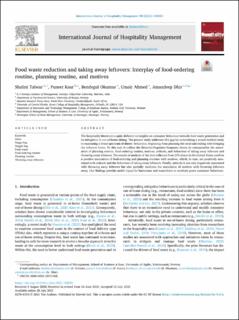Food waste reduction and taking away leftovers: Interplay of food-ordering routine, planning routine, and motives
Journal article, Peer reviewed
Published version

View/
Date
2021Metadata
Show full item recordCollections
Original version
International Journal of Hospitality Management. 2021, 98, 103033. 10.1016/j.ijhm.2021.103033Abstract
The hospitality literature is quite deficient in insights on consumer behaviour towards food waste generation and its mitigation in out-of-home dining. The present study addresses this gap by undertaking a mixed-method study to examining a broad spectrum of diners’ behaviour, beginning from planning the meal and ending with bringing the leftovers home. To this end, it utilises the Stimulus-Organism-Response theory to conceptualise the association of planning routine, food-ordering routine, motives, attitude, and behaviour of taking away leftovers and throwing away leftovers. The results of analysis of the data collected from 276 diners in the United States confirm a positive association of food-ordering and planning routines with motives, which, in turn, are positively associated with attitude and the behaviour of taking away leftovers. Finally, attitude is not only negatively associated with throwing away leftovers but also partially mediates the association of motives with throwing leftovers away. Our findings provide useful inputs for businesses and researchers to motivate green consumer behaviour.
